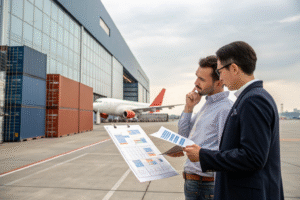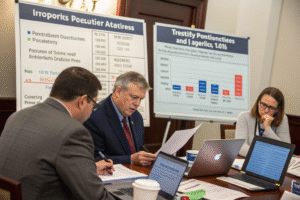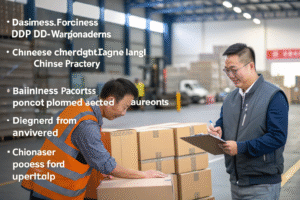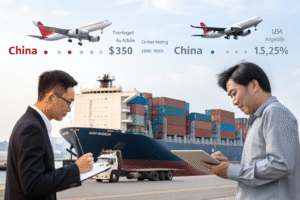Tariffs are more than taxes—they’re time traps and cost inflators. I’ve seen importers watch their landed cost skyrocket after new tariffs took effect overnight. And for many businesses, these charges aren’t just a line item—they determine whether a shipment is profitable or not.
Tariffs directly affect international freight costs by increasing landed costs, influencing routing choices, altering documentation needs, and shifting demand between countries.
In this article, I’ll explain how tariffs influence your shipping costs and what experienced freight forwarders like GeeseCargo do to help you minimize their impact.
How Do Tariffs Increase Total Landed Costs?
Tariffs are import duties charged by destination countries. They are calculated based on product classification, origin, and declared value.
Tariffs are added to the total landed cost, which includes product cost, freight, insurance, and customs duties—making them a direct contributor to overall freight expenses.

How Are Tariffs Calculated on Imports?
Tariffs are often based on HS Codes assigned to each product. Once the customs value is declared (product cost + freight + insurance), the applicable tariff rate is applied. Tools like DutyCalculator help us estimate costs before shipping.
What Is the Impact on Profit Margins?
A 10% tariff on a $50,000 shipment adds $5,000 to landed cost. If that margin wasn’t built into pricing, it could wipe out profit. We help clients model tariff-inclusive quotes so they don’t get blindsided after customs.
How Do Tariffs Affect Routing and Country of Origin Choices?
Tariffs don’t apply equally across the board. They vary by country, trade agreement, and product category.
High tariffs often push businesses to explore alternate sourcing countries or indirect shipping routes through lower-duty zones.

How Do Trade Agreements Reduce Tariffs?
FTAs like USMCA or RCEP allow for reduced or zero-duty treatment if certain origin rules are met. We help clients work with suppliers to ensure certificates of origin are prepared and compliant.
Can Rerouting or Transshipment Help?
In some cases, routing through bonded zones or free trade ports allows deferral or avoidance of duties. For example, we’ve used Hong Kong or Malaysia as staging hubs before final export to the U.S. under compliant conditions. We always verify legality with customs brokers before applying such methods.
How Do Tariffs Change Documentation and Processing?
More tariffs mean more documentation. Customs wants proof that your goods are correctly classified, valued, and marked.
Forwarders must prepare precise paperwork to meet customs requirements for tariff calculation, which reduces clearance time and prevents audits.

What Documents Are Required for Tariff Clarity?
Common forms include the commercial invoice, packing list, HS classification sheet, and certificate of origin. We also prepare explanatory notes and importer value declarations when needed, especially for audits under CBP regulations.
What Happens if Documents Are Missing or Wrong?
Incorrect HS codes or missing origin details often lead to incorrect tariffs—or worse, penalties. Customs may hold the shipment, reclassify the goods, and apply higher duties. We use tools like CargoWise to pre-validate documentation before submission.
How Can Freight Forwarders Help Reduce Tariff Costs?
While we can’t erase tariffs, we can reduce their impact through planning, sourcing, and smart logistics.
Forwarders assist with tariff mitigation by guiding on duty reduction programs, bonded warehouses, and compliant sourcing alternatives.

What Are Bonded Warehouses and FTZs?
Goods stored in bonded warehouses are not subject to duties until they leave for local sale. This allows delayed payment and cash flow relief. We help clients register and ship to bonded zones in both the U.S. and China.
Can Reclassification or Substitution Help?
Sometimes a product can be reclassified under a different heading that attracts lower duty—provided it is legally valid. We consult licensed brokers or rulings databases like CBP Rulings to assist clients. In rare cases, altering the product’s country of origin also qualifies it for lower rates.
Conclusion
Tariffs aren’t going away. But with the right freight forwarder, they don’t have to wreck your shipping budget. At GeeseCargo, we help you understand, anticipate, and legally reduce tariff-related costs by managing documentation, routing smartly, and using every trade benefit available. If you want to turn tariff surprises into predictable costs, let us be your partner in the process.









